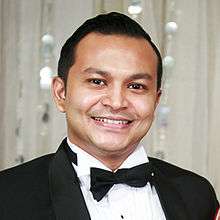Gazi Nafis Ahmed
Gazi Nafis Ahmed is a Bangladeshi scholar and artist working with photography.[1] He was born in November 1982 in Dhaka, Bangladesh. Ahmed comes from the renowned Gazi family, who were one of the Baro Bhuyan(Twelve Zaminders of Bengal) in sixteenth century, from the Bhawal Estate now known as Gazipur in Bangladesh.[2]
Gazi Nafis Ahmed | |
|---|---|
 | |
| Born | Nafis Ahmed 21 November 1982 Dhaka, Bangladesh |
| Nationality | Bangladeshi |
| Occupation | Artist |
| Years active | 2012–present |
| Website | gazinafis |
Biography
From 2012 to 2014, he worked at VII Photo Agency, working with John Stanmeyer.[3]
Nafis did his schooling from Bangladesh International Tutorial, a prominent private schools in Bangladesh. He studied art and design at the Sir John Cass Department of Art, Media & Design of London Guildhall University in London and photography at the Danish School of Media and Journalism in Denmark. Nafis was awarded full scholarship by Istituto Europeo di Design in Madrid to do Masters of Fine Arts in photography. In 2016, Nafis was invited as a scholar at The Center for Social Difference at the prestigious Columbia University.[4]
Gazi Nafis Ahmed was awarded at the international Pride Photo Award 2015 held at the historic Oude Kerk, Amsterdam ("old church") in Amsterdam. There were 3,800 entries from 60 countries around the world.[5] Pride Photo Award is considered to be the most prestigious contest for photography about gender diversity. Nafis won in "Stories of Love and Pride" category for his series "Inner Face". In 2013, Nafis received the Blub Award from Format International Photography Festival in the United Kingdom. He is the youngest Bangladeshi artist to have a solo show at the esteemed Bengal Gallery of Fine Arts.[6][7] Gazi Nafis Ahmed participated at the Mining Warm Data exhibition. It was curated by Diana Campbell Betancourt, artistic director of DAS.[8] In 2014, artworks by Nafis were featured in the landmark show B/Desh in Dhaka Art Summit, the largest platform for South Asian art, curated by Deepak Ananth. His work has been exhibited in UK, Spain, Netherlands, China, India and Bangladesh. Some of the organizations he has worked with are International Finance Corporation of World Bank Group, Medicins Sans Frontieres, UNAIDS, UNDP, WFP, Save The Children. His photos have graced the pages of The New York Times, The New Yorker, and The Guardian, among others.[9][10]
In 2013, Nafis organized the first ever photography forum for the pioneer photographers of Bangladesh called “Evolution of Photography” at the Edward M Kennedy Center in Dhaka, which gave them a platform to share their experiences and discuss untold rich history of photography in the country.[11][12]
One of his critically acclaimed serial “Inner Face” [13][14][15][16] addresses the sensitive and precarious issues of human rights of the LGBT community. They convey the subtle sense of challenge in the expressions of the community in a traditional and conservative culture like Bangladesh. The photographs[17][18] seem to carry that sense of “conquering” social taboos, of trying to become free of the manacles that tie the inborn or acquired identity to social norms.[19][20][21][22]
Participation at La Biennale di Venezia
Gazi Nafis Ahmed represented Bangladesh at the 58th edition of La Biennale di Venezia or Venice Biennale 2019. The venue of the Bangladesh Pavilion is Palazzo Zenobio. The theme of the pavilion is "Thirst"[23] where Gazi Nafis Ahmed displayed his series "Inner Face", as a reminder for the thirst for love, acceptance and knowledge. Five artists [24] participated at the Bangladesh pavilion.
References
- Gazi Nafis Ahmed - LensCulture. "Gazi Nafis Ahmed". LensCulture.
- Administrator. "Gazi Nafis Ahmed, Artist". gazinafis.com. Archived from the original on 2019-06-04. Retrieved 2015-04-15.
- "Innate Identities". The Daily Star.
- "Reframing Gendered Violence". Columbia University Homepage. Archived from the original on 2017-06-20. Retrieved 2016-10-08.
- "Nafis wins Pride Photo Awards". The Daily Star.
- "Photos: 'Made in Bangladesh' Takes Behind-the-Scenes Look at Garment Workers". Asia Society.
- "Cauldron of creativity: exploring artists' relationship between spaces and memories". Deccan Chronicle.
- "Mining Warm Data". Dhaka Art Summit. Archived from the original on 2016-10-21. Retrieved 2016-02-11.
- Homa Khaleeli. "Inside Bangladesh's garment factories: life and work in a dangerous industry". the Guardian.
- "What They Were Thinking". The New York Times Magazine.
- "Blog Snacks - Jeff Gantner - Writer". jeffgantnerwriter.com. Archived from the original on 2015-05-18. Retrieved 2015-04-15.
- "The garment factories of Bangladesh by Gazi Nafis Ahmed". Tasveer Journal. Archived from the original on 2015-03-19.
- Sean O'Hagan. "Passion and persecution:photographing Bangladesh's outcasts". The Guardian.
- Harshini Vakkalanka. "Body of evidence". The Hindu.
- "Interview: Photographer Sheds Light on 'Inner Face' of Bangladesh's Gay Community". Asia Society.
- "A Rare, Intimate Glimpse Into Bangladesh's LGBTQ Community Through Gazi Nafis Ahmed's Lens". Homegrown.
- "'Happy as we are': Bangladesh's hidden LGBT community – in pictures". The Guardian.
- Shahana Yasmin. "This Photo Series Takes Us into the Gritty Life of Bangladesh's LGBT Community". Vagabomb.
- "INNATE IDENTITIES : Lives of hermaphrodites captured through lens". New Age. Dhaka.
- "South Asia in focus: 5 curated shows at Dhaka Art Summit 2014". artradarjournal.com.
- Bibi van der Zee. "I want to help the LGBT community in Bangladesh make their voices heard". The Guardian.
- Eva Fernández del Campo. "GAZI NAFIS AHMED: El Bosque Y Sus Pobres Hadas". El Estado Mental.
- "Bangladesh's 'Thirst' at 58th Venice Art Biennale". The Daily Star.
- "5 Bangladeshi artists to participate in Venice Biennale". New Age.